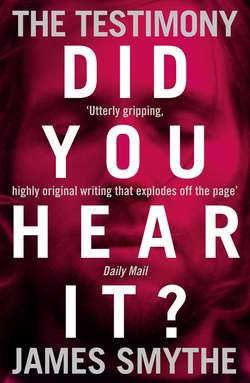Читать книгу The Testimony - James Smythe, James Smythe - Страница 59
Elijah Said, prisoner on Death Row, Chicago
ОглавлениеThe Broadcast invaded my dreams. In my dream-state I was a child, back with my mother, my father, but knowing then what I know now: how she would die, the man that he would become, the purpose he would feel in his heart, watched over by a loving God that he did not yet know existed. My father played with me in the street, throwing a baseball that looked like the moon; he promised me the world. I told him to not lie to me; and then I heard the voice. It creaked in as part of my father’s speech, at first: My Children, he said to me, and I was ready to protest, to say that I was their only child, unless – are there more secrets? Then I realized that I was awake, that I was on my cot, as always. I got out of bed, dressed myself, ignored the rest of the prisoners. What was their time? Mine was limited. Let us out, some of them shouted, we’re innocent. None of us were innocent, not on this corridor. You did not get to the corridor by being innocent.
What d’you reckon? Finkler stuck his hands through the bars of my cell, reaching across from his, flapping his hand like a flag alerting me to his presence. I mean, holy crow, he said, how in the hell did we all hear that? You think it was God? He seemed almost completely unaware of who I was, how little I related to him. He would snort through my prayers, when he bothered to hear them, and yet here he was, hand of friendship extended. Sounded like God, he said. I did not reply. I would ignore him, and he would retreat. He carried on talking: If it was God, do you think He’ll forgive us? I’ve never contemplated that part, you know? That we’re here, and we were going to die, sure, but I always assumed there was nothing after, nothing at all, just blackness, you know? I’m sure that I heard him smirk at that, a private joke, however unintentional. I was a rarity on the corridor, a prisoner that they couldn’t pigeonhole. I had education, which so many here did not; the crime I was here for wasn’t thoughtless, or without reason and logic. I was the spearhead of a sacrifice, which many did not try to understand, or did not care to. They saw me as just another man of colour, a brute, a thug: they offered me drugs, or expected that I had access to them; they assumed that I was willing to fight them, which I was, but not on their whims. Finkler persisted. I mean, sheesh, God! Wonder if He spoke to everybody or just us guys? Maybe He’s been on our side all along; maybe He knows I’m innocent. Finkler had killed six women over a twenty-year period: they caught him burying the seventh alive. His guilt was without question.
The alarms rang out, even in the corridor, where we were completely locked down. When our cells opened it was at the behest of armed guards, guns pointed at us. Those who are lost have nothing to lose, the governor said of us. The alarms seemed louder than we had ever heard them. Somebody’s kicking up a fuss, Finkler said, must have made a break for it. Or they’re fighting. I didn’t try to see. I sat on my cot and prayed, again, that I might see some way through this. Shit, Finkler said – and what I wouldn’t have given for him to shut his mouth – maybe they’ll stay our sentences, because, you know, God’s here! They won’t stay our sentences, I said to him, breaking my silence. Our sentences are not just in this world. Oh, sure, he said, but, you know, I’d rather face that one in forty years, when it’s actually my time. He fell quiet. In another life, I would have ended Finkler’s life in a heartbeat. Here, now, he sounded sad, the tragically hopeful murderer, rapist. He pleaded for pity and forgiveness, because his crime was thoughtless, driven by lust and desire, not the betterment of his people. He and I were nothing alike.
